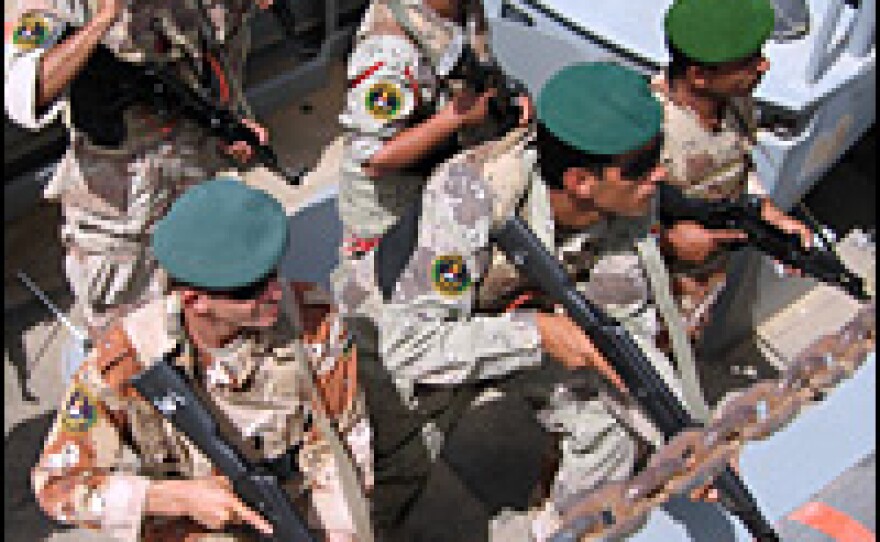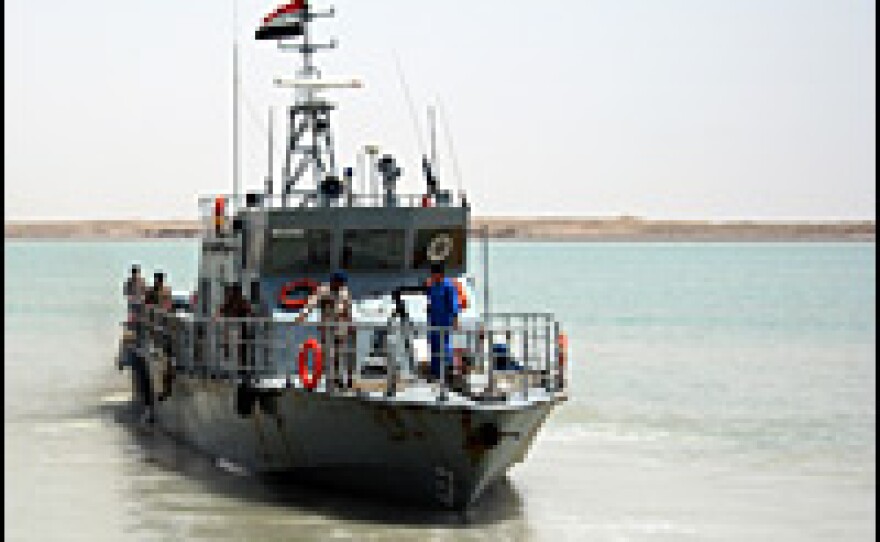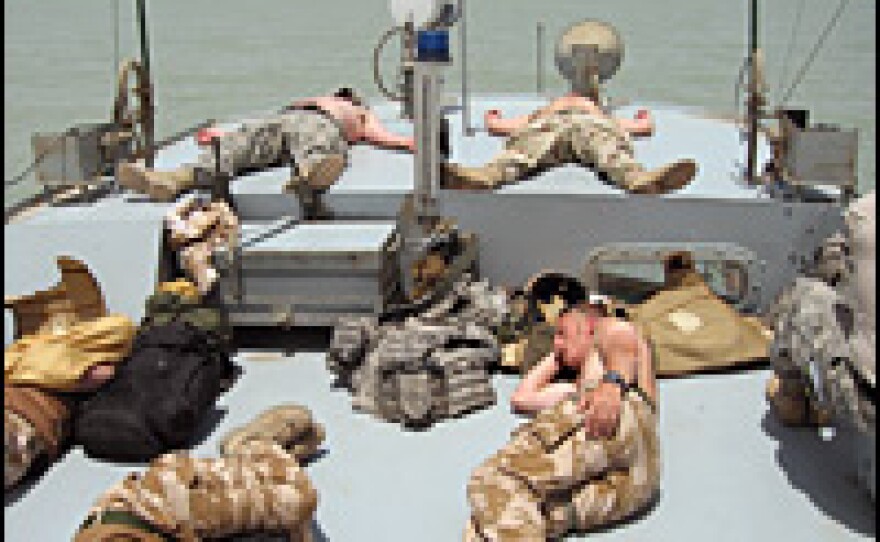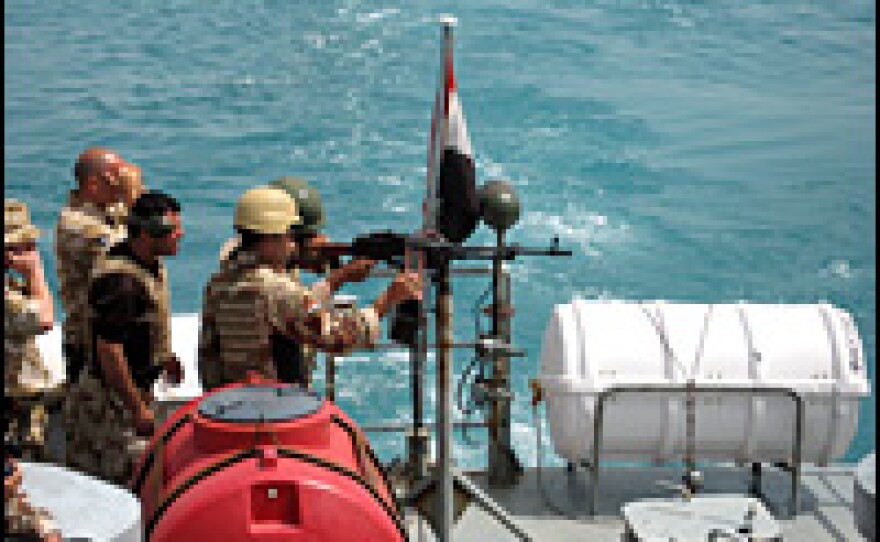


A tiny port tucked into an inlet on the Persian Gulf is arguably the most important spot in Iraq. At Umm Qsar, most of Iraq's food flows in on grain-laden ships, and most of its oil flows out from two offshore platforms.
Coalition forces here are training a small Iraqi navy to protect the port from attack, but Iraq's naval forces are a long way from being able to do the job on their own.
Royal Navy Cmdr. Jock Alexander, a Sean Connery kind of Scotsman, directs the Naval Training Team, about 70 strong.
Umm Qsar's rusty, dusty port is so important to Iraq, he says, because "about 90 percent of the bulk food for Iraq comes through the port, and by bulk food, I mean grain, wheat, sugar, salt."
But what goes out of the oil platforms just offshore may be even more important to Iraq's future.
"About 3 percent of the world's daily oil supply is currently coming from those two oil platforms," he says. "Which equates to about 92 percent of this country's GNP per day — $200 million U.S. a day, depending on the price of oil."
A Role-Playing Exercise
Alexander's force consists of members of the British navy and American Navy and Coast Guard, all here to train Iraqi seamen and marines to someday assume the defense of the port and the platforms.
They're starting from the bottom. The U.S. Coast Guard teaches Iraqi marines how to board and search vessels using a stack of steel shipping containers as an improvised vessel. Through an interpreter, an Iraqi officer shouts questions at the role-playing skipper before boarding.
"Do you have any weapons on board or ammunition?" he shouts.
"No, no weapons," comes the response. It's followed by questions about port of origin, crew makeup and so on, punctuated with an occasional wisecrack.
"Are any of your crew psychologically impaired? Retarded?"
"That's debatable, but as far as I know, none."
Then the Iraqis storm aboard and the role-playing becomes more serious as crew members are searched and handcuffed when weapons are found.
Officers say the Iraqi marines, once trained, are indispensable in boarding ships whose crews speak only Arabic.
Target Practice and Pursuit
An Iraqi patrol boat, belching soot and sporting patches of rust, heads out to the offshore oil platforms. The crew will be checked on their ability to intercept boats trying to penetrate the security zone surrounding the oil terminals. Maj. David Spink of the British Royal Marines is running the test, called sector guardian.
"So I'm looking at everything, top to bottom, in terms of how these guys perform," Spink says. "And at the end of it, I'll say you're either good enough or you're not to come out here and do it for real. That's sector guardian in a nutshell."
First, an oil drum is dropped overboard for target practice. Until this day there's only been enough ammunition to fire single rounds from machine guns during practice. Now, British gunner Adrian Walker is trying to make the gunners cut loose.
"Six- to eight-round bursts, that's what we are trying to achieve with them," he says.
But it's hard to break old habits, although the message to fire faster finally gets through.
Another reason the gun crews are reluctant to fire long bursts is because the gun belts have to be reloaded by hand, one bullet at a time. The preloaded belts sent from the Iraqi military are often defective.
After the firing exercise, a small, open British boat, acting as an intruder, speeds toward the oil platform. The Iraqi patrol boat, with Capt. Salam Abed at the helm and on the radio, attempts to intercept it. The speedboat ducks behind the patrol boat and tears away.
The boat ignores flares and radio warnings. Abed escalates force. "Golf whiskey, golf whiskey. Warning shots. Golf delta, golf delta."
The boat speeds away and Abed commands "golf X-ray, golf X-ray," meaning, use deadly force.
The gunner on the .50-caliber bow gun simulates the bucking action of the gun. But then the tired Iraqi patrol boat has to abandon pursuit.
Even though these boats are only a few years old, they weren't designed for warm waters, so they overheat quickly. And years of sanctions against Iraq has made spare parts unavailable.
Taking Baby Steps
Later, after landing on the bullet-riddled Khawr Al Amaya oil platform, just three miles away from Iran, Spink explains why he passed Abed, even though the attack boat got past him a couple of times.
"The ones who fail simply go through the responses in a mechanical fashion," he says. "The guys today were spatially aware, they did have reasonable command and control and understanding of what was going on."
Spink says right now the coalition forces are taking baby steps training the Iraqi navy. But it has to be done well, as past attacks demonstrate. In 2004, al-Qaida went after the platforms; it failed, but killed three U.S. sailors. And a year ago, 15 British sailors were seized by the Iranians near here.
Royal Navy Capt. Guy Robinson, who also sits on the platform, gazing out at an endless row of fishing dhows about a mile away, says, "Indeed, any one of these vessels that operate around here could also be hiding a terrorist attack, and that we have to be on our guard for all the time."
That's why there are several coalition warships and Coast Guard cutters constantly prowling these waters. Robinson says they hope to turn these duties over to the Iraqi navy, but given its present condition, that seems optimistic.
Iraq's Umbilical Cord
Cruising back into the port, a big freighter comes into view from the deck of the patrol boat. A huge tube snakes down into the ship. Ian Stubbs of the Royal Navy says you could call it Iraq's umbilical cord, because most of the country's food flows through here.
"The grain pumps are basically massive Hoovers that suck the grain right out of the ships' holds and pump it directly onto the lorries," Stubbs says. "They're filling up individual lorries from a 60- to 80-ton grain ship, so you can imagine how long that takes."
Three to four days, it turns out. A line of trucks stretches to the horizon, waiting to be loaded to haul grain across Iraq. Shippers hate the wait and many won't bother. But there are big plans afoot to expand and improve the port. And new boats are supposed to be on the way for the small Iraqi navy next year.
In the meantime, this tiny port and those exposed oil platforms remain stark symbols of Iraq's fragility.
Copyright 2022 NPR. To see more, visit https://www.npr.org. 9(MDAzMjM2NDYzMDEyMzc1Njk5NjAxNzY3OQ001))







